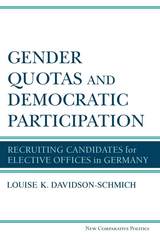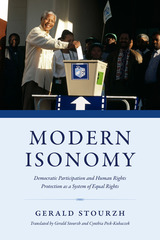2 books about Democratic Participation

Gender Quotas and Democratic Participation
Recruiting Candidates for Elective Offices in Germany
Louise K. Davidson-Schmich
University of Michigan Press, 2016
Since the 1970s, quotas for female political candidates in elections have proliferated worldwide. Beyond increasing the numbers of women in high-level elected bodies and, thereby, women’s political representation, advocates claim that quotas foster gender-equal participation in democracy and create female role models. According to this reasoning, quotas also overcome barriers to women’s political participation, especially discriminatory practices in the selection of electoral candidates. Though such claims have persuaded policy makers to adopt quotas, little empirical evidence exists to verify their effects.
In Gender Quotas and Democratic Participation, Louise K. Davidson-Schmich employs a pathbreaking research design to assess the effects of gender quotas on all phases of political recruitment. Drawing on interviews with, and an original survey of, potential candidates in Germany, she investigates the extent to which quotas and corresponding increases in women’s descriptive representation have resulted in similar percentages of men and women joining political parties, aspiring to elected office, pursuing ballot nominations, and securing selection as candidates. She also examines the effect of quotas on discriminatory selection procedures. Ultimately, Davidson-Schmich argues, quotas’ intended benefits have been only partially realized. Quotas give women greater presence in powerful elected bodies not by encouraging female citizens to pursue political office at rates similar to men’s, but by improving the odds that the limited number of politically ambitious women who do join parties will be elected. She concludes with concrete, original policy recommendations for increasing women’s political participation.
[more]

Modern Isonomy
Democratic Participation and Human Rights Protection as a System of Equal Rights
Gerald Stourzh
University of Chicago Press, 2021
Until the eighteenth century, Western societies were hierarchical ones. Since then, they have transformed themselves into societies dominated by two features: participatory democracy and the protection of human rights. In Modern Isonomy, distinguished political theorist Gerald Stourzh unites these ideas as “isonomy.”
The ideal, Stourzh argues, is a state, and indeed a world, in which individual rights, including the right to participate in politics equally, are clearly defined and possessed by all. Stourzh begins with ancient Greek thought contrasting isonomy—which is associated with the rule of the many—with “gradated societies,” oligarchies, and monarchies. He then discusses the American experiment with the development of representative democracy as well as the French Revolution, which proclaimed that all people are born and remain free and with equal rights. But progress on the creation and protection of rights for all has been uneven. Stourzh discusses specifically the equalization of slaves, peasants, women, Jews, and indigenous people. He demonstrates how deeply intertwined the protection of equal rights is with the development of democracy and gives particular attention to the development of constitutional adjudication, notably the constitutional complaint of individuals. He also discusses the international protection human rights. Timely and thought-provoking, Modern Isonomy is an erudite exploration of political and human rights.
The ideal, Stourzh argues, is a state, and indeed a world, in which individual rights, including the right to participate in politics equally, are clearly defined and possessed by all. Stourzh begins with ancient Greek thought contrasting isonomy—which is associated with the rule of the many—with “gradated societies,” oligarchies, and monarchies. He then discusses the American experiment with the development of representative democracy as well as the French Revolution, which proclaimed that all people are born and remain free and with equal rights. But progress on the creation and protection of rights for all has been uneven. Stourzh discusses specifically the equalization of slaves, peasants, women, Jews, and indigenous people. He demonstrates how deeply intertwined the protection of equal rights is with the development of democracy and gives particular attention to the development of constitutional adjudication, notably the constitutional complaint of individuals. He also discusses the international protection human rights. Timely and thought-provoking, Modern Isonomy is an erudite exploration of political and human rights.
[more]
READERS
Browse our collection.
PUBLISHERS
See BiblioVault's publisher services.
STUDENT SERVICES
Files for college accessibility offices.
UChicago Accessibility Resources
home | accessibility | search | about | contact us
BiblioVault ® 2001 - 2024
The University of Chicago Press









